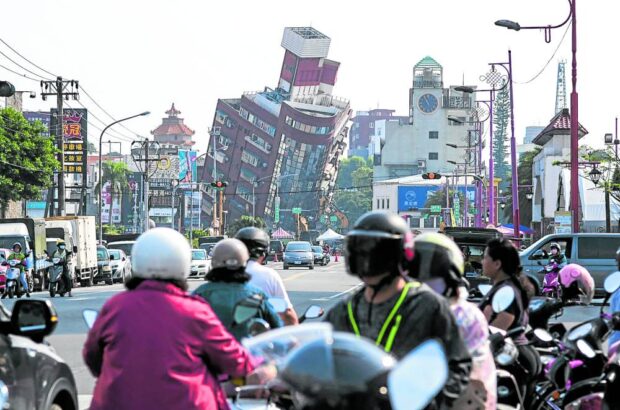
The Philippines should prepare for the “Big One,” a powerful earthquake similar to what struck Hualien, Taiwan on April 4 (above), warns the Office of Civil Defense. SAM YEH/AFP
MANILA, Philippines — Ensuring the structural integrity of buildings is the best solution to prevent loss of lives in the event of a strong earthquake, an official from the Office of Civil Defense (OCD) has said.
According to OCD Administrator Usec. Ariel Nepomuceno, engineering solutions and compliance with the building code are the “best preparedness measures for earthquakes.”
READ: ‘Big One’ scenario in Metro: 52,000 dead, 500,000 injured
Improve efforts, other measures
“We really need to improve our efforts for these alongside other measures,” Nepomuceno said on Saturday.
“We need to ensure that buildings and facilities are strong enough to withstand strong earthquakes,” he stressed.
The government official particularly cautioned against the “Big One,” which refers to a large earthquake generated by active fault lines which may significantly rattle the country and its surrounding areas, according to state seismologists.
He warned against possible damage to thousands of structures including buildings and houses in Metro Manila if the “Big One” were to rattle the country.
Casualty projection
“Again, let us be reminded of the casualty projection for the Magnitude 7.2 earthquake generated by the West Valley Fault. At least 30,000 to 48,000 individuals might die in the Greater Metro Manila Area,” he explained.
He also mentioned that the recommendation to strengthen engineering solutions and building compliance in preparation for potential disasters applies not only to Metro Manila but also to cities across the archipelago.
READ: About 5,000 Filipinos affected in Taiwan quake; no repatriation bid yet
“This is a very clear indication that there are a lot of things that we must do to advance our preparedness for earthquakes.” he said.
“Structures within no build zone and landslide prone areas must not be also allowed,” Nepomuceno added.
It can be recalled that neighboring countries of the Philippines were recently rattled by two strong earthquakes in a span of just a few days, with a magnitude 7.4 in Taiwan and a magnitude 6.0 in Japan.